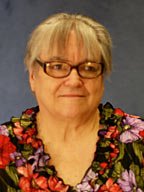Editor’s note: This is the latest in a series of stories about the more than 50 Presbyterian mission workers and international peacemakers who are speaking in more than 150 presbyteries in the coming month as part of World Mission Challenge. — Jerry L. Van Marter
When Alice Winters enters her classroom in Colombia, she engages her students as both professor and learner.
This veteran Presbyterian Church (U.S.A.) mission worker teaches her students about biblical languages and history. At the same time they teach her about a biblical faith that sustains them amid poverty and the violence perpetrated by a decades-long civil war.
“I have learned so much from the Colombian people about what it means to be a Christian, what it means to live out our faith in the real world,” says Winters, a faculty member at Colombia Reformed University in Barranquilla.
After more than three decades in Colombia, Winters has taught most of the pastors serving in the Presbyterian Church of Colombia. She also is a popular teacher for lay people, both Protestants and Catholics, who want to learn more about the Bible. As she travels throughout the country, she senses people are hungering to know more about the Bible.
Why this interest in Scripture? “It’s the Holy Spirit,” she quickly replies. “But I also think when you are surrounded by violence you think about death and who you are. There is a hunger to find hope in all the poverty, suffering and violence. I admire their ability to find hope and rejoice in hope.”
For Winters, however, the biblical message is not just about finding comfort amid adverse circumstances. It’s also about challenging oppression. That’s a reading of Scripture that is shared by the Presbyterian Church of Colombia.
Some of Alice’s former students have incurred the wrath of guerilla and paramilitary groups because they have spoken out against the violence and aided people displaced by it. One of them, Milton Meija, a former general secretary of the Presbyterian Church of Colombia, dared to form an ecumenical network to call attention to human rights violations.
“He challenged the other Protestant churches and the Catholic Church to defend human rights and deal with specific problems,” Winters says. “It earned death threats for him and his family.”
In 2006 the threats became so serious that Mejia and his family moved to the United States. He recently returned to Colombia, where he and his wife assumed positions with the university, Mejia as its director of research. He is helping students from various academic fields focus their research interests on problems that are relevant to Colombia.
Winters traces her path to mission service to a Washington, D.C., church on the edge of a low-income neighborhood. It was the 1960s and civil unrest was rampant among residents of the nation’s capital. It was a different experience for the young IRS lawyer who had grown up in Michigan and Illinois. “I had never seen real poverty,” she says.
The congregation began to reach out to the neighborhood with tutoring and other programs and Winters became heavily involved in those efforts. “I began to feel what I was doing on evenings and weekends was more important than my day job,” she says.
Sensing a call to the ministry, Winters entered Gordon-Conwell Theological Seminary thinking she would serve in an inner-city ministry. Those plans began to change during her second year of study when she participated in an exchange program in Latin America. She preached in several congregations in Colombia and Guatemala, where she received much affirmation and invitations to return. She began to ponder the possibility of cross-cultural service.
Her decision was sealed when she learned that the Presbyterian Church of Colombia had contacted the Presbyterian mission offices in the United States formally inviting her to serve in that country.
She began her service in Colombia in 1977 in rural communities, helping set up a program of theological education by extension. Six years later she was invited to join the faculty of a new theological school founded by Colombian Presbyterians. The school later became part of Colombia Reformed University, the first Protestant university in Colombia.
Currently Winters is on home assignment in the United States. She looks forward to returning to her students and ministry partners.
While she performs her ministry against a backdrop of violence, Winters is not concerned about her personal safety. Americans are not targeted in Colombia and their presence often discourages violence. That’s why over the past five years a number of Presbyterians from the United States have spent four to six weeks in Colombia accompanying church workers and human rights leaders.
Nevertheless, serving in Colombia is not without risk. It’s a risk Winters feels called to take. “Jesus Christ gave his life for me,” she says. “If something happens to me, it would be my privilege to give my life for Jesus Christ as he did for me.”
For health reasons, Alice Winters is undertaking a limited speaking schedule during Mission Challenge ’09. For information about and letters from PC(USA) mission workers around the world, visit the Mission Connections Web site.

